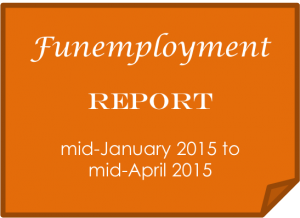As a Contractor, It’s Up to Me to Protect My Time
Since my defense last summer, I’ve been contracting with a company that provides scientific services. This job has been my main source of income outside of my fellowship from this past spring. I’ve stuck with this job even though most people I know who have done it have quit after a short time, and I think the difference is that I’ve decided to fiercely protect my time.
I am a perfectionist, as are many scientists. I allowed my perfectionism too much free reign during graduate school, which I believe was detrimental to my graduate career. I’m working really hard now on not being such a perfectionist, specifically in being able to determine when a piece of work is good enough to conclude and send out the door. My contract job is one place where I’ve been able to exercise this good-enough muscle.
My contract job pays per assignment, not per hour. Since I’m not busy with school or a formal job right now, it would be feasible for me to spend a lot of time perfecting these assignments. Of course, if I did that, I would have much less time for accomplishing other goals such as building my business, and my hourly pay rate would be terrible. I have to draw my own boundaries on the time I spend on my contract job since my life and employer will not do it for me.
There is a quality control aspect to these assignments I’m completing, which could easily trigger my perfectionism if I let it. A superior assesses a certain percentage of the assignments and assigns a score to each one. There is a minimum acceptable score and a score that will net you a bonus if you achieve it consistently.
At first when I started this job, my goal was to quickly get into the bonus score range and work to stay there so I could be paid a bit more per assignment. But, I quickly realized that the time investment it would take for me to consistently achieve that score would not be worthwhile (e.g., if the bonus is 10% additional pay, I would be spending far more than 10% additional time to be sure to achieve it every time). Instead, I ‘settled’ for nearly always getting scores that were between the minimum acceptable score and the bonus range score.
I don’t mean this to sound like I am content doing a bad job with these assignments. I am doing an adequate job – I’m just not going above and beyond trying to get a perfect or very high score. I believe that this attitude toward protecting my time has enabled me to stay in what is typically a high-turnover position for this company. I know a lot of people who have had this same job in the past, and most don’t last more than a few months. The ones who tell me why they left consistently cite not being able to earn a decent hourly rate.
Now, I don’t think I’m necessarily a lot faster at this job than my friends and acquaintances. I just think I’ve been able to be satisfied with doing a good job instead of a fantastic job and not let the scoring feature psych me into spending too much time. I also don’t accept assignments that I know would take me an above average amount of time to complete, and it did take me a few months to figure out what to avoid, so maybe the people I know were attempting to complete low-quality assignments. In this sense I try to work smart, not only hard.
I am pretty happy with the average hourly rate I’ve been able to maintain over the past six months or so (it’s about twice my “hourly rate” from my grad stipend and spring fellowship pay). I keep very careful track so I know exactly the amount of time I’m putting in to each assignment and what I’m being paid. I do occasionally misjudge – I took an assignment outside of my typical pattern this month, thinking in that case it would net me a higher pay rate, but it turned out to be slightly below my average (and stressful, to boot). But overall I am happy with my own performance, and based on the fact that I keep getting assignments, I think my employer is, too. Perhaps they appreciate that I am a known quantity and have some longevity in this position.
My goal for each month this summer is to earn $1,000 from this job. I was able to achieve that last November and December, which were my only fully available months after my assignment volume ramped up last fall and before my fellowship started (I also earned at least $500 in the first half of January and the second half of April, which were my half-months before and after my fellowship). However, if I notice that my hourly rate drops significantly or it takes me too much time to generate acceptable scores (thus I don’t feel I can do a good enough job and still be paid decently), I am not afraid to back off from this job or quit. My primary focus this summer is on building my business, so I need to be sure that I’m devoting sufficient time to that endeavor.
Are you a perfectionist? Do you know to draw the line and say some work is “good enough?” How do you protect your time as a contractor or freelancer?
photo by dawolf-
Filed under: income · Tags: contracting, self-employment, time


 Make Hay While the Sun Shines
Make Hay While the Sun Shines Funemployment Report: Fellowship Period
Funemployment Report: Fellowship Period I Don’t Work for the Money
I Don’t Work for the Money Big Wins, Small Wins, and the Payoff-to-Energy Ratio
Big Wins, Small Wins, and the Payoff-to-Energy Ratio


You’re very lucky because you have control over your time, your job is per assignment, and you are a perfectionist. Just make sure, Emily, that time doesn’t suffer because sometimes being a perfectionist is not good like what I experienced when I focused so much on details that I did not consider the time I was using. 🙁
Yes, that is exactly my issue as well!
All of my work is paid per assignment too, so I have to be careful with my time. If I tinker with something all day instead of moving onto something else, I make considerably less that day! It sounds like you made a good compromise that is in your best interest. When you get a different job and start earning more money, you can go back to being a perfectionist!
I think this lesson will be translatable to a lot of other areas of life. I’ll always have perfectionist tendencies, but I think they are rarely useful!
I have the perfectionist issue, which is why I rarely seek out freelance writing. I just spend way too much time on it to make the pay worthwhile.
It’s great that you know yourself well enough at this point to know what’s going to be profitable for you and what’s not. I recently became a staff writer for a website and I’m really glad I’m not doing it for the money because I have sunk SO much time into it!
I only do freelance stuff when it will help my main career. So I’m pretty price-insensitive and do a good job regardless of the pay. My rates are too high for non-career helping stuff for anybody (so far) to be able to afford them.
I definitely see the appeal of doing extra work to further one’s career. Do you have a standard set price that you then discount if it will help your own career, or do your prices for other kinds of work not even come into the discussion?
[…] main way I’m earning money these days is contract work. My goal is to bring in at least $1,000 from this source every month. I’m pushing myself, though, […]
[…] This resulted in a rather difficult last year for us both personally and financially. I was funemployed for a season and then spent 3 months in DC doing a fellowship. Our most recent solution to our two-body problem has been for me to be self-employed, building my business while I also do contract/freelance work. […]
[…] July 13. I did the bare bones work necessary on my business in the first couple weeks of July (no contract work), and then did almost no work while we were traveling. Kyle’s paycheck in July was […]
[…] 5:00 PM – 6:00 PM contract work […]
[…] every month. It’s the unbudgeted money from Kyle’s paycheck plus the discretionary portion of my contractor paycheck. This month, the amount available was $224.08 and we had two miscellaneous expenses totaling […]
[…] services company. I accept short assignments that have a fixed amount of pay. I learned early on how to choose and complete these assignments so that I have a decent average hourly pay rate. This side hustle is very part-time (e.g., last month I spent less than 15 hours on it) so it […]
[…] I said, I’m not bringing in any money from my business right now, only from my contract work, so Kyle and I are living off his income, my small side income, and our savings. Strangely, having […]
[…] As soon as I saw that we would have to use American funds in the 401(k), I delved into learning about self-employment retirement plans. From reading descriptions of SEPs, individual 401(k)s, and SIMPLE IRAs and taking this quiz, I determined that an individual 401(k) plan would be best for us at this point with my business and contract work. […]